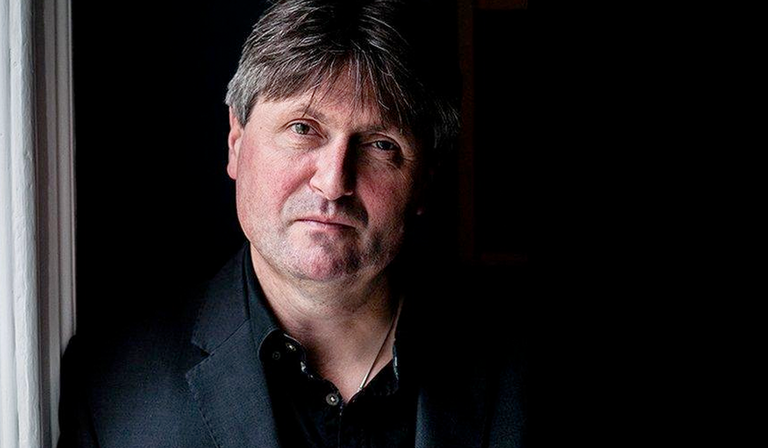On a sparkling spring evening I drive to the crest of a moorland road, and marvel at the barren beauty of the upper Colne Valley, before descending to Marsden, the Pennine town cradled under its slopes. I’m coming to see its most famous son, Simon Armitage, who now lives a few miles away, but is returning for a night of community performances, poetry and—intriguingly—a “gig”.
Early, I approach the bolted door of the Mechanics’ Institute, and through its stone walls catch my first muffled earful of the poet laureate’s downbeat timbre in rehearsal. I can’t pick out words, but against a beat, he sounds a bit like one of Jarvis Cocker’s occasional spoken interludes in Pulp songs. I worm my way in and find Armitage, who suggests it’d be better to talk at the end.
So I head off and mingle with the Unity Voices choir, originally of Marsden mums, but 30 years on from their founding now mostly Marsden grandmas. They’re rendering one of four new Armitage poems about the town in song. Nearly all seem to have been at school with young Simon, some at the primary a road away. I ask one—Kirsty—if she has fond infant memories: “Well,” she says, “you know what young boys are like!” Go on: “Him and another lad were giving me stick for doing Judo. We had a fight, he hit me right on the nose. It killed. I tried, but I just couldn’t catch him,” a lucky escape since “I was good at Judo, too.”
Fortunately, everyone rubbed along tolerably at Colne Valley high, and—in a more distant way—ever since. The choir sing Armitage’s words sweetly. The Marsden schoolchildren of today perform dances arranged around Armitage verses about the bloody construction of the canal through to Manchester (“you can’t dig out the dark,” “there’s tunnel at the end of the light”) and stage tableaus based on his poem (or confession?) about an unreturned loan from the village library.
After the interval, Armitage himself is up on the stage—looking somewhere between Morrissey and Alan Bennett, although wearing a stranger patched jacket than either would go for. Flanked by guitarist, Richard Walters, and Patrick Pearson on keyboards, he keeps a glass of red at hand. The trio call themselves LYR, short for Land Yacht Regatta. Armitage—in his own description to me afterwards—never sings, but “just talks, in a lyrical way,” though Walters adds the odd soulful wail. He’s previously insisted that song lyrics and poems are entirely different forms, but admits that LYR has edged him towards “pitching words into a middle territory between poem and song.”
“I’m shifty,” the man whose radio show is called The Poet Laureate Has Gone to His Shed confesses, adding: “I went into poetry because it was alternative, ‘other’, furtive and a refuge.” But he relishes the “contradiction” of bringing verse to the stage: “you can be out there like tonight, but can also retreat behind the covers of a book.” “Marsdeners like to show off,” he announces, “even if they don’t know it.”
As we’re chatting about Marsden’s “collar of moors,” and a social history in which the Luddites loom large, we’re interrupted by locals from the audience including his mum, who lives “at the end of the street.” You can take man a few miles out of Marsden, it seems, but not Marsden out of the man. Shifty he may be, but his poem “Cradle” makes vivid the ways that places have of getting under human skin, along the way from nursery to cemetery. And in the face of Armitage’s final appeal for his shadow to be lowered into the “shallows and reeds of Wessenden Head,” it’s a battle to maintain a dry eye.












